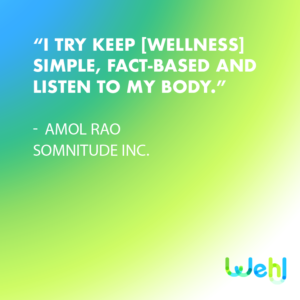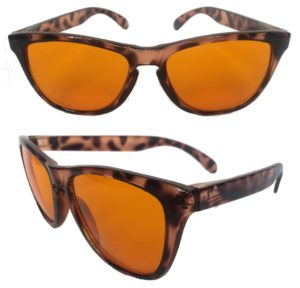We all know that sleep is important for wellness, but getting consistent, uninterrupted sleep is often just a dream! Blue light exposure at night is a factor that affects our sleep, so it makes sense that blocking blue light at night can be an easy way to support healthy sleep. To learn more, we connected with Amol Rao, an engineer and the founder of Somnitude Inc. Amol has always been interested in applying the principles of engineering to improve sleep and address circadian rhythms. Somnitude’s main focus has been about how to use scientifically validated products to mitigate the negative impacts associated with nighttime light exposure.
We chatted with Amol about what blue light is, how it affects our sleep and what we can do to help prevent the effects of it.

WEHL: Tell us a little about yourself and why you became interested in sleep and starting Somnitude.
AR: I always considered myself a night owl. I could stay up late until anytime, but found it impossible to wake up early. More importantly, I never felt truly refreshed when I woke up. For example, I’d need a coffee or multiple coffees to keep me going throughout the day.
I was doing a Masters in Industrial Engineering and looking into improving shift work schedules and reducing jet lag when I became interested in circadian rhythms. On my own time I began researching the truly intriguing science of rhythms, and how they play a large role in our lives. I started playing around with the various things that can impact circadian rhythms, and came across research on blue light filtering eyewear (done in the early 2000’s).
Based on discussions and articles I read, I decided to try out a pair of blue light blockers I found online (they were from Uvex). The first time I tried them out, I didn’t think much would come of it. I put the glasses on 2 hours before my bedtime and went about my evening activities. I felt tired a bit earlier than usual, and went to bed. I woke up – feeling refreshed, and alert before 7 am! I couldn’t believe it. I felt very focused throughout the day, and had a lot more energy than usual. It could have been partly placebo, but the effect repeated itself the next night.
As it turns out – this isn’t the experience that everyone has. I was and still am particularly sensitive to blue light, as some people naturally are.
But this experience was enough to convince me that more people could benefit by wearing blue light blockers, and so I decided to start a company in the area. That is how Somnitude was born.
WEHL: What is your philosophy on wellness?
AR: I try to keep it simple, fact based and listen to my body. Less reliance on external, and more reliance on internal. Finding ways to replenish spiritual, physical and cognitive batteries on a regular basis.
 WEHL: What is blue light?
WEHL: What is blue light?
AR: Blue light is the type of light that falls within 440 – 480 nm wavelengths on the electromagnetic spectrum.
In less technical words, it means this type of light carries higher energy than other types of light, like orange or green light. Conversely, blue light has less energy than violet or UV rays. It’s simply a term used to describe a portion of the visual spectrum.
Blue light is emitted naturally by the sun, and artificially by any light source that looks ‘white’. LED’s, computers and phones emits high amounts of blue light.
WEHL: How does blue light affect our sleep?
AR: In two ways.
Blue light from the sun in the morning, signals day time to our brain. This signal is passed to the rest of the body, and helps to ‘wake us up’. It gets your muscles going, raises cortisol levels and reduces melatonin levels. Blue light exposure from the sun (indirectly of course!) is extremely important. Most people spend all their time indoors and do not get enough blue light exposure during morning when it is very important.
The second way is at night.
In the past 100 years, and particularly since the advent of the phone, we have been exposed to more and more blue light at night. This blue light, although weak by comparison to the sun, is high enough to trick our brain into thinking that it is daytime.
When exposed to blue light at night, our brain delays the production of the hormone melatonin, which disrupts our sleep. We stay awake longer as we ‘feel awake’ and this is why waking up (and feeling good) is so difficult for those who are exposed to blue light before bed time.
Some people are not as affected by blue light. For example those who have a good ‘lighting profile’ (i.e. spend their days outside) or those who are naturally less affected by it.
Children seem to be more affected by blue light than adults. And adults in turn are more affected than the elderly.
WEHL: Why is sleep so important?
AR: Outside of exercise and nutrition, sleep is the best thing you can do for yourself. No other process comes close in the wide ranging positive impacts it has on us. For example regular restful sleep improves cognition, helps regulate hormones, improves mood and behaviour, and in the long term may help combat several diseases. I don’t need to list all the benefits as I’m sure readers are aware of the benefits of healthy sleep.
My personal favorite tidbit: sleeping well improves the way that others perceive your sociability, trustworthiness, attractiveness, and health! This is according to a study conducted at the Stockholm University and Karolinska Institute.
WEHL: What happens if we don’t get enough sleep?
AR: Lots of studies have been completed on this topic.
Firstly, a lack of sleep impairs memory and reduces cognitive abilities. Over time, mood and behavior are adversely affected too. Many studies have shown that a lack of sleep is usually associated with long-term health consequences. We know that sleep deprivation results in an immune system response and over time – this could increase the risk of heart disease, stroke and other medical conditions.
Furthermore, sleep deprivation has a pronounced negative effect on learning and performance. Several studies have shown that it is very difficult for sleep-deprived people to process external information while memory and recall functions also decline. For instance, sleep deprivation plays a crucial role in many serious accidents, such as late night car crashes or lapses in medical judgement.
Sleep deprivation negatively impacts our ability to focus and perform high-level cognitive functions. A major consequence of this is that effects of sleep deprivation may be felt by employers – statistics indicate that insomnia costs the U.S workforce $63 Billion annually in lost productivity.
In conclusion, sleep is a vital component of many daily functions such as performance and focus, and over time has the ability to strongly influence overall health.
WEHL: What is the circadian rhythm (AKA sleep-wake cycle)?
AR: The word ‘circadian’ comes to us from Latin ‘circa’ = about & ‘dies’ = day. It refers to the physical, mental and behavioral changes that follow a roughly 24-hour cycle, responding to light and darkness in an organism’s environment.
Circadian rhythms occur naturally within us however the rhythms are strongly affected by external cues such as light and temperature. Over a short term, the daily rhythm can be influenced by diet, stress, activity levels and other health factors.
There are many rhythms within the human body. In animals the regulator of the overall circadian rhythm is a region in the brain called the SCN. You can think of the SCN as the master coordinator; it sends out signals to other regions of the brain and in this way regulates specific functions within the body. A key signal the SCN sends is to the pineal gland to secrete melatonin. Melatonin is also known as the ‘vampire hormone’ or ‘sleep hormone’ because its levels are elevated at night time in the absence of light.
Functions regulated by the biological clock include hormone levels, digestion, immune function, and body temperature.
WEHL: What is the role of blue light in your circadian rhythm?
AR: Although our circadian rhythm is generated internally, it is always being adjusted by external factors.
The main external factor is light. How? It has been shown through research, that exposure to light before sunrise will shift the ‘awake’ phase earlier and the same pulse of light administered after dusk will shift delay the ‘sleep’ phase. This means getting some light early in the morning will cause you to feel tired earlier that night. And getting light late at night, will cause you to sleep later that night. Your body is constantly adjusting its sleep-wake cycle to reflect external day and night.
However, different wavelengths of light have different impacts on us. There is a receptor in the eye that that is specifically tied to our circadian rhythms. This receptor is primarily affected by blue light. It’s affected by other light too – but blue light has up to 3x the impact.
Why blue light? There is no clear reason why blue light is so important to our circadian rhythms. It could be that blue light is important because it’s the colour of the sky – a light source that all our early ancestors would have been exposed to. But that is speculative.

WEHL: How do the blue light blocking glasses work?
AR: Blue blocking glasses prevent blue light from reaching the eye. They are worn about 2 hours before bed time. The absence of blue light helps our brain understand that it is night time, and to begin unwinding for the day. It does this by releasing melatonin. As melatonin production increases we feel sleepier and thus fall asleep on time.
WEHL: We’ve seen a few different types of light blocking glasses; what is the difference between orange vs. clear blue blockers?
AR: There is a lot of confusion around this subject, so we drafted a blog article on this here.
Different types of blue blocking glasses exist for different reasons. The two main reasons are; daytime wear for those who use digital devices and nighttime wear for those who need them for sleep.
Some people get eye strain as a result of looking at digital devices all day, and so they get blue blockers which are clear or yellow. These typically block out 10%-40% of blue light. Remember we don’t want to block out all blue light during the day. Exposure to the right amount of blue light, at the right times is very healthy.
Some people want to optimize their sleep. They get orange blue blockers like the ones made by Somnitude, which block out between 95% – 99% of blue light. These are specialized for evening wear, and help promote sleep.
WEHL: How do you use the glasses?
AR: I wear them about 2 hours before my intended bed time. I go about my usual activities (on computer, phone etc.) until I feel tired. I try and wear the glasses at the same time every night.
WEHL: Do blue light blocking glasses help with eyestrain from screen time? Should we wear these while using the computer?
AR: We are not experts on eyestrain – see an optometrist or opthamologist for that.
What I will say is that people may want to rethink wearing blue blockers during the day. I think most people already do not get enough sunlight during the day. And so for them, wearing glasses that block even more blue light may be problematic. Although for those with sensitivity or other health considerations, it would make sense to block daytime blue light.
WEHL: Can children use the glasses too?
AR: Yes – absolutely! In fact parents should take particular care of their children’s exposure to blue light.
Why? Adolescents and children appear to have a lower threshold of impact – meaning they are more affected by blue light than adults. We’re not sure why, but the rate of suppression of melatonin is higher for children than for adults, for the same amount of blue light. There is some great research coming out of the University of Colorado, Boulder on pediatric sleep.
Children also need more sleep than adults – between 9 and 13 hours depending on their age. So being kept awake could mean that they don’t get enough sleep during their crucial development years.
Lastly, children of this generation are almost always on digital devices in the evening. This means that children are at greater risk of light induced sleep disruption.
WEHL: How can we tell if the blue light blockers are working for us?
AR: Listen to your body. If you find that wearing the glasses makes you feel calm, and helps you unwind, then keep wearing them. Many people report feeling ‘more tired’ or yawning earlier while wearing the glasses. This is a great sign. It means your body is naturally calling you to sleep.
WEHL: Do you have any tips for helping us find the right blue light blocking glasses for us?
AR: We are not the only retailers, and I encourage everyone to do their own research. Some things to keep in mind:
-
- Check the transmission of the blue blocking glasses
- Is the seller reputable?
- Do they have someone who you can reach out to in case there are any questions?
- Is the style suitable for your needs?
- Is the price point good?
WEHL: What makes Somnitude unique?
AR: We are the only company with medically approved Blue Blocking Glasses in Canada. That’s allowed us to work with medical professionals and sleep clinics to help their patients. We conduct rigorous testing of our glasses and ensure that the light being filtered matches what we say, and the purpose it’s used for. We offer a variety of styles and are available on Amazon, online and as well as through insurance companies at an affordable price.
We are also focused on the wider circadian puzzle. We want to harness circadian science to help improve sleep and well being. There is still a long way to go!
Connect with Amol and Somnitude:
- Web: www.blueblockglasses.com
- Email: [email protected]
- Wehl Platform: @somnitude
We invite you to join our all-in-one healthy lifestyle app at Wehl.com!



